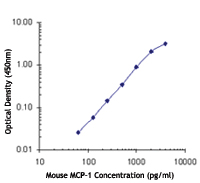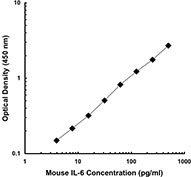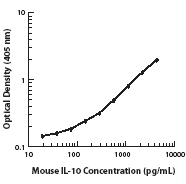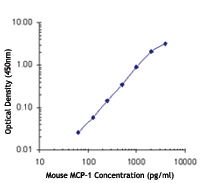- Regulatory Status
- RUO
- Other Names
- Monocyte chemotactic protein 1, chemokine (C-C motif) ligand 2, Ccl2, JE, Scya2, monocyte chemotactic and activating factor, MCAF.
- Ave. Rating
- Submit a Review
- Product Citations
- publications
| Cat # | Size | Price | Quantity Check Availability | Save | ||
|---|---|---|---|---|---|---|
| 576509 | 4 pack | 76€ | ||||
MCP-1, CCL2 is a member of the CC ß chemokine family. It is widely expressed in endothelial cells, smooth muscle cells, and monocytes in response to several atherogenic stimulants such as CD40 ligand, platelet derived growth factor (PDGF), interleukin-1β (IL-1β) and oxidized low density lipoprotein. Several recent in vivo studies have disclosed critical roles of MCP1 in atherosclerosis. In addition, MCP-1 has been implicated in monocytic infiltration of tissues during several inflammatory diseases and in macrophage-mediated tumor growth suppression in mice. CCL2 has been shown to have direct effects on tumor cells in an autocrine and paracrine fashion in multiple cancers, including breast, lung, cervix, ovary, sarcoma, and prostate. In addition, MCP-1 plays a key role in the regulation of MMPs during transmigration. Ccl2 induces migration of MonoMac6 by induction of MMP2. MCP-1 and Ccl3/MIP-1alpha mediate firm adherence and (subsequent) transmigration of neutrophils via protein synthesis and secondary generation of leukotrienes and PAF, which in turn directly activate neutrophils in mouse cremaster muscle. MCP-1 is induced from endothelial cells by MIF and from fetal skin fibroblast by IL-17.
Product DetailsProduct Details
- Source
- Mouse MCP1, amino acids Gln24-Arg96 (Accession # NM_011333) was expressed in E. coli, approximately 13.8 kD
- Formulation
- Lyophilized in sterile-filtered PBS, pH 7.2, containing 1% BSA, 0.09% sodium azide, and protease inhibitors.
- Concentration
- Lot-specific (to obtain lot-specific concentration and expiration, please enter the lot number in our Certificate of Analysis online tool.)
- Storage & Handling
- Unopened vials can be stored between 2°C and 8°C until the expiration date. Prior to use, reconstitute the lyophilized powder with 0.2 mL of PBS containing a carrier protein (e.g., 1% BSA, protease free), pH7.4. Re-cap vial, vortex. Allow the reconstituted standard to sit at room temperature for 15 minutes, vortex again to mix completely. The reconstituted standard stock solution can be aliquoted into polypropylene vials and stored at -70°C for up to one month. Do not re-use diluted standards. Avoid repeated freeze/thaw cycles.
- Application
-
ELISA
- Recommended Usage
-
Each lot of this protein is quality control tested by ELISA assay. For use as an ELISA standard, a standard curve comprised of doubling dilutions from 1,000 pg/ml to 7.8 pg/ml is suggested. It is recommended that the reagent be titrated for optimal performance for each application.
- Application Notes
-
This MCP-1 protein is useful as a standard for a mouse MCP-1 sandwich ELISA, using unlabeled 4E2/MCP antibody (Cat. No. 506004 ) for capture and biotinylated 2H5 antibody (Cat. No. 505908) for detection.
-
Application References
(PubMed link indicates BioLegend citation) -
- Liu Z, et al. 2013. J. Immunol. 191:857. PubMed
- Product Citations
-
Antigen Details
- Structure
- Chemokine
- Distribution
-
MCP-1 (Ccl2) is secreted by fibroblast, endothelial cells, smooth muscle cells, tumor cells, phytohemaglutinin stimulated mononuclear cells, TNF-a stimulated osteoblastic MC3T3-E1 cells.
- Function
- MCP-1 induces migration of monocytes, memory/activated T cells, NK cells, myeloid dendritic cells, neutrophils, astrocytes, mesangial cells, and bone marrow endothelial cells. MCP-1 is induced by IL-1b, TNF, IFNg, PDGF, IL-4, MIF, and IL-17.
- Ligand/Receptor
- MCP-1 mediates its cellular effects primarily through CCR2 receptor
- Bioactivity
- ED50 = 8 -15 ng/ml, corresponding to a specific activity of 1.25 — 0.6 x 105 units/mg, as determined by the dose dependent chemoattraction of THP-1 cells
- Biology Area
- Cell Biology, Neuroinflammation, Neuroscience
- Molecular Family
- Cytokines/Chemokines
- Antigen References
-
1. Loberg RD, et al. 2007 Cancer Research 67:9417-9424.
2. Gregory JL, et al. 2006 J Immunol 177:8072-8079.
3. Qui Z, et al. 2009 Immunology 214:835-842.
4. Reichel CA, et al. 2009 Arterioscler Thromb Vasc Biol. ATVBAHA.109.193268v1
5. McQuibban GA, et al. 2002 Blood 100:1160-1167 - Gene ID
- 20296 View all products for this Gene ID
- UniProt
- View information about CCL2 on UniProt.org
Related FAQs
Customers Also Purchased



 Login / Register
Login / Register 
















Follow Us